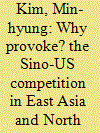| Srl | Item |
| 1 |
ID:
163785


|
|
|
|
|
| Summary/Abstract |
On April 27, 2018, at the third two Koreas summit in South Korea, the president of
South Korea Moon Jae-in and the chairman Kim Jong Un promised to open a new
path of peace. The two Koreas seemed to successfully handle problems between
them. However, based on the previous behaviors of North Korea, we should not
be too optimistic. The reason why I write this paper in this peaceful mood is
that paying attention to national security is always worthwhile. Many scholars
have found several reasons for North Korea’s provocations against South Korea.
However, there is a lack of empirical support regarding them. I try to test and find
the reasons for North Korea’s provocations. I use multivariate regression and Prais–
Winsten regression to test my hypotheses. Domestic stability and power succession
have statistically significant relationships with the number of provocations, but the
results are quite mixed.
|
|
|
|
|
|
|
|
|
|
|
|
|
|
|
|
| 2 |
ID:
149017


|
|
|
|
|
| Summary/Abstract |
This article seeks to make sense of North Korean provocations in light of the Sino-US strategic competition in post-Cold War East Asia, where such variables as China’s rise, US’s pivot to Asia, and growing Sino-ROK economic ties are driving the strategic choices of major states in the region. The article examines the main motivations behind Pyongyang’s provocations since the end of the Cold War, discusses their implications for the Sino-US strategic competition in East Asia, and offers predictions about the future of North Korean provocations. The central thesis of the article is that Pyongyang has exploited the Sino-US strategic competition in East Asia for its regime survival. By raising North Korea’s strategic value to China, the intensifying Sino-US competition allows Pyongyang to continue provocations, regardless of Beijing’s explicit opposition.
|
|
|
|
|
|
|
|
|
|
|
|
|
|
|
|